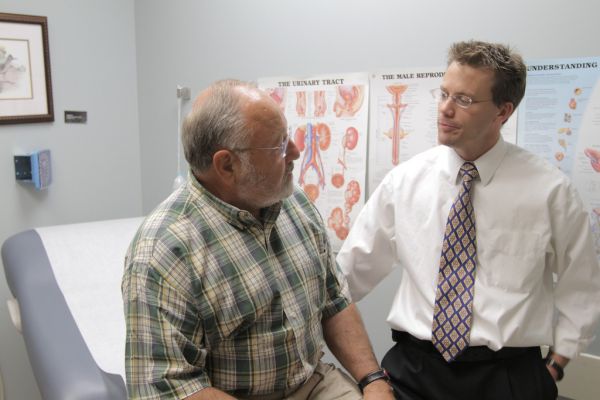Ten years ago, patients diagnosed with advanced-stage kidney cancer had few options, and none of them were very promising. But in recent years, we have seen a revolution in kidney cancer treatment with ten new targeted drugs winning FDA approval. While we hesitate to call any of them a “cure” just yet, these drugs are making it possible to treat advanced kidney cancer more like a chronic disease, offering potential survival for stage 4 patients that’s measured in years rather than months.
The most recent approvals—nivolumab (Opdivo®), cabozantinib (Cometriq™) and a combination therapy that uses lenvatinib™ (Lenvima™) and everolimus (Afinitor®)—are making a dramatic impact. With these therapies, more patients are surviving longer, and with better quality of life.
Targeted therapy differs from chemotherapy. Chemotherapy drugs attack any cells that divide rapidly, such as tumor cells, but can also harm other healthy rapidly-dividing cells of the body, such as those in the digestive tract or hair follicles. In contrast, targeted drugs focus on a specific component or unique feature of a particular cell type, such as a certain protein or genetic mutation, in order to “turn off” or “turn on” the function of that cell or interrupt its communication with other cells. In this way, targeted drugs can block or inhibit the process that allows cancer cells to divide, grow and proliferate. Nivolumab is a drug that works to remind the body’s natural immune system that the cancer cells are foreign and must be attacked.
Never miss another Cancer Talk blog!
Sign up to receive our monthly Cancer Talk e-newsletter.
Sign up!Nivolumab binds itself to the body’s T cells, a type of white blood cell important to your immunity. In doing this, it blocks an interaction with certain proteins (PD-1 to PD-L1) on the cancer cells, and allows a previously subdued immune response to start up and work against the cancer. Nivolumab is administered through an IV (through the vein) once every two weeks and is a very well-tolerated drug. Clinical trials demonstrated that nivolumab offers improved survival in patients with metastatic renal cell carcinoma.
Cabozantinib binds to certain receptors on cancer cells, blocking the activity of multiple proteins on the surface of the cell, which are necessary for the cancer cell to divide and proliferate. Cabozantinib is a pill taken orally and was approved based on a phase III trial that demonstrated progression-free survival as well as overall survival.
Lenvatinib targets different protein receptors on cancer cells, which are necessary to promote new blood vessels to the tumor, tumor growth and cell division. In kidney cancer, we combine lenvatinib with everolimus, which prevents the translation of genes that regulate cancer cell growth. Both of these drugs are in pill or tablet form and taken orally, and this combination was approved based on the results of a randomized phase II trial.
These drugs are all approved as second-line therapies, which means that oncologists prescribe them only after the first-line therapy stops effectively controlling the cancer. Oncologists choose the most appropriate drug for each patient based on several factors, among them: whether the patient also has an autoimmune disease or cardiac problems, and the type of drug that was used as the first-line treatment. These drugs became approved treatments for kidney cancer after years of research, first in the laboratory, and then in clinical trials. As a National Cancer Institute-designated Comprehensive Cancer Center, Roswell Park has a robust clinical research program where patients can gain access to the very latest drugs and even the future drugs in clinical trials. For example, Roswell Park participated in the clinical trials for nivolumab, and my kidney cancer patients on the trial were able to receive nivolumab about four years before its approval by the FDA.
Roswell Park currently has three clinical trials investigating potential new drugs and combinations for advanced or metastatic kidney cancer. Many more trials are slated to open in the first-line and second-line settings.

